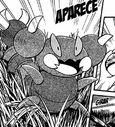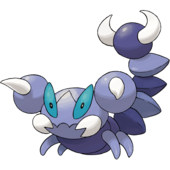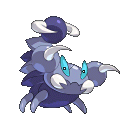From Bulbapedia, the community-driven Pokémon encyclopedia.
|
|
| Line 97: |
Line 97: |
| |bwdex=As soon as the tail claws close, its needle tips secrete poison. It can survive a year without food. | | |bwdex=As soon as the tail claws close, its needle tips secrete poison. It can survive a year without food. |
| |b2w2dex=It lives in arid regions and can go without food for a year while waiting for prey. | | |b2w2dex=It lives in arid regions and can go without food for a year while waiting for prey. |
| | |xdex=It grips prey with its tail claws and injects poison. It tenaciously hangs on until the poison takes. |
| |ydex=It burrows under the sand to lie in wait for prey. Its tail claws can inject its prey with a savage poison. | | |ydex=It burrows under the sand to lie in wait for prey. Its tail claws can inject its prey with a savage poison. |
| }} | | }} |
Revision as of 19:45, 24 October 2013
|
|
|
|
|
|
|
|
|
|
|
|
|
|
|
Height
2'07"
Imperial
|
0.8 m
Metric
|
2'07"/0.8 m
Red-Striped
|
0'0"/0.0 m
Blue-Striped
|
0'0"/0.0 m
|
|
|
Weight
26.5 lbs.
Imperial
|
12.0 kg
Metric
|
26.5 lbs./12.0 kg
Red-Striped
|
0.0 lbs./0.0 kg
Blue-Striped
|
0.0 lbs./0.0 kg
|
|
|
|
|
|
|
|
|
|
|
|
|
EV yield
HP
0
|
Atk
0
|
Def
1
|
Sp.Atk
0
|
Sp.Def
0
|
Speed
0
|
| Base Exp.: 114
|
Battle Exp.: 1141*
|
|
|
|
|
Skorupi (Japanese: スコルピ Scorpi) is a dual-type Poison/Bug Pokémon.
It evolves into Drapion starting at level 40.
Biology
Physiology
Skorupi resembles an over-sized, pale purple scorpion. Its claws and tail have been swapped, giving it two stingers and a claw tail. The miniature jaws, claws, and tail claws are white. Its arms are attached directly to its head, close to its teal eyes. A pointed marking joins the eyes. The head, arms, two tail segments, and all four legs are light blue, while the body, tail end, and other two tail segments are a darker shade of blue.
Gender differences
None.
Special abilities
Skorupi have a deadly poison in their claws allowing them to use Poison-type moves. Its mouth also contains a powerful jaw enabling it to use Bite and Crunch. It can also survive a year without food.
Behavior
It buries itself in sand and lies in wait for unsuspecting prey, and grips prey with its tail claws, injecting poison. It tenaciously hangs on until the poison takes.
Habitat
Skorupi lives in deserts and dry areas like Reversal Mountain, though it can be found in marshy areas such as the Great Marsh.
Diet
- Main article: Pokémon food
Skorupi is an active hunter that uses its poison to subdue its prey.
In the anime
Major appearances
Skorupi made its debut in A Trainer and Child Reunion! under the ownership of Aaron.
Minor appearances
A Skorupi also appeared in Another One Gabites the Dust!.
A Skorupi was also seen at the Shelter Town's Pokémon Center in Battling a Cute Drama!.
Another Skorupi also appeared in Historical Mystery Tour!.
A photo of a Skorupi appeared in The Four Seasons of Sawsbuck!.
In the manga
In the Pokémon Adventures manga
Platinum tried to catch a Skorupi in the Great Marsh, but she failed and it fled.
In the TCG
- Main article: Skorupi (TCG)
Game data
Pokédex entries
| This Pokémon was unavailable prior to Generation IV.
|
|
|
|
|
|
|
| Generation IV
|
|
| Diamond
|
It grips prey with its tail claws and injects poison. It tenaciously hangs on until the poison takes.
|
| Pearl
|
It lives in arid lands. It buries itself in sand and lies in wait for unsuspecting prey.
|
| Platinum
|
As soon as the tail claws close, its needle tips secrete poison. It can survive a year without food.
|
| HeartGold
|
It burrows under the sand to lie in wait for prey. Its tail claws can inject its prey with a savage poison.
|
| SoulSilver
|
{{{soulsilverdex}}}
|
|
|
| Generation V
|
|
| Black
|
As soon as the tail claws close, its needle tips secrete poison. It can survive a year without food.
|
| White
|
{{{whitedex}}}
|
| Black 2
|
It lives in arid regions and can go without food for a year while waiting for prey.
|
| White 2
|
{{{white2dex}}}
|
|
|
| Generation VI
|
|
| X
|
It grips prey with its tail claws and injects poison. It tenaciously hangs on until the poison takes.
|
| Y
|
It burrows under the sand to lie in wait for prey. Its tail claws can inject its prey with a savage poison.
|
|
|
Game locations
| This Pokémon was unavailable prior to Generation IV.
|
|
|
|
|
|
|
|
|
|
|
|
|
In side games
Held items
Stats
Base stats
| Stat
|
Range
|
| At Lv. 50
|
At Lv. 100
|
40
|
|
100 - 147
|
190 - 284
|
50
|
|
49 - 112
|
94 - 218
|
90
|
|
85 - 156
|
166 - 306
|
30
|
|
31 - 90
|
58 - 174
|
55
|
|
54 - 117
|
103 - 229
|
65
|
|
63 - 128
|
121 - 251
|
Total: 330
|
Other Pokémon with this total
|
- Minimum stats are calculated with 0 EVs, IVs of 0, and (if applicable) a hindering nature.
- Maximum stats are calculated with 252 EVs, IVs of 31, and (if applicable) a helpful nature.
|
Pokéathlon stats
Type effectiveness
| Under normal battle conditions in Generation V, this Pokémon is:
|
|
|
|
|
|
|
|
|
|
|
|
|
Learnset
|
|
|
|
- Bold indicates a move that gets STAB when used by Skorupi
- Italic indicates a move that gets STAB only when used by an Evolution of Skorupi
- Click on the generation numbers at the top to see level-up moves from other generations
|
Side game data
Evolution
Sprites
Trivia
Origin
Skorupi is based on a scorpion. It has some characteristics that resemble a vinegarroon, a similar arachnid. Its Water 3 Egg Group designation may be a reference to the ancient group of arthropods known as sea scorpions that used to inhabit the oceans and may have been the ancestors of modern scorpions.
Name origin
Skorupi and Scorpi are a shortening of scorpion.
In other languages
| Language
|
Title
|
Meaning
|
 Japanese Japanese
|
スコルピ Scorpi
|
From a shortening of scorpion
|
 French French
|
Rapion
|
From scorpion
|
 Spanish Spanish
|
Skorupi
|
Same as English name
|
 German German
|
Pionskora
|
From Skorpion
|
 Italian Italian
|
Skorupi
|
Same as English name
|
 Korean Korean
|
스콜피 Scolpi
|
Transliteration of Japanese name
|
 Mandarin Chinese Mandarin Chinese
|
紫天蠍 Zǐ Tiān Xiē
|
Literally "Purple sky scorpion". 天蠍 also refers to the constellation Scorpius.
|
 Cantonese Chinese Cantonese Chinese
|
|
|
|
|
|
|
|
|
|
External links

|
This Pokémon article is part of Project Pokédex, a Bulbapedia project that aims to write comprehensive articles on each Pokémon species, as well as Pokémon groups and forms.
|












































































